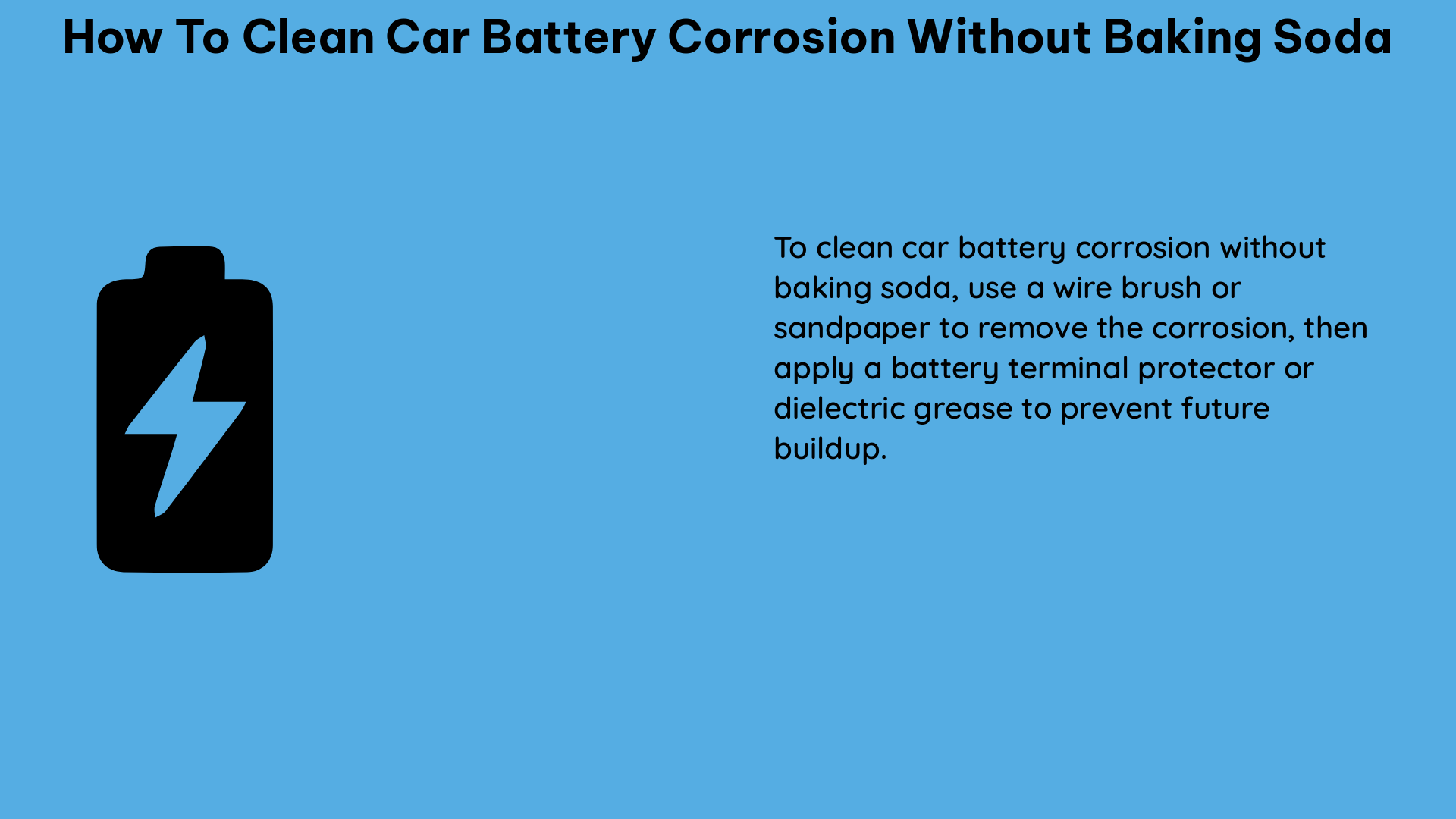Cleaning car battery corrosion is a crucial task to maintain the health and performance of your vehicle’s electrical system. While baking soda is a common household solution, there are several alternative methods that can be just as effective, if not more so. In this comprehensive guide, we’ll explore the various techniques and tools you can use to clean car battery corrosion without relying on baking soda.
Understanding Car Battery Corrosion
Car battery corrosion is a common issue that occurs when the battery terminals and connections are exposed to moisture, heat, and other environmental factors. This corrosion can lead to a variety of problems, including reduced battery life, poor electrical connections, and even potential safety hazards.
The corrosion is typically a white, blue, or green buildup on the battery terminals and connections, and it can be caused by a variety of factors, including:
- Overcharging the battery
- Exposure to high temperatures
- Leaks in the battery casing
- Improper installation or maintenance
Cleaning Car Battery Corrosion Without Baking Soda

While baking soda is a popular choice for cleaning car battery corrosion, there are several other effective methods that you can use without relying on this household ingredient. Here are some of the most effective techniques:
Using a Wire Brush
One of the simplest and most effective ways to clean car battery corrosion without baking soda is to use a wire brush. This tool can be used to scrub away the corrosion from the battery terminals and connections, revealing the clean, shiny metal underneath.
When using a wire brush, it’s important to take safety precautions, such as wearing gloves and eye protection, and working in a well-ventilated area. Additionally, you should disconnect the battery cables in the correct order (negative first, then positive) to prevent any electrical shorts or damage to the battery or vehicle.
Employing a Battery Terminal Cleaner
Another effective option for cleaning car battery corrosion without baking soda is to use a commercial battery terminal cleaner. These specialized products are designed to dissolve and remove corrosion, making it easy to wipe away the buildup.
Battery terminal cleaners typically come in the form of a spray or liquid, and they often contain active ingredients like phosphoric acid or other corrosion-fighting compounds. When using these products, be sure to follow the manufacturer’s instructions carefully and take appropriate safety precautions.
Utilizing a Vinegar Solution
If you prefer a more natural approach, you can use a vinegar solution to clean car battery corrosion. Mix one part white vinegar with one part water, and use a clean cloth or sponge to apply the solution to the affected areas. Allow the solution to sit for a few minutes before scrubbing the corrosion away with a wire brush or other cleaning tool.
Vinegar is an effective acid that can help neutralize the battery acid and dissolve the corrosion. However, it’s important to note that vinegar can also be corrosive, so you should take care to rinse the area thoroughly with water after cleaning to prevent any further damage.
Employing a Battery Cleaning Brush
For a more targeted approach, you can use a specialized battery cleaning brush to remove car battery corrosion. These brushes are designed with stiff bristles that can effectively scrub away the buildup without damaging the battery terminals or connections.
When using a battery cleaning brush, be sure to work in a well-ventilated area and take appropriate safety precautions. You may also want to use a small amount of water or a mild cleaning solution to help loosen the corrosion before scrubbing.
Utilizing a Battery Terminal Protector
To prevent future car battery corrosion, you can use a battery terminal protector. These products are designed to create a barrier between the battery terminals and the elements, helping to prevent the buildup of corrosion over time.
Battery terminal protectors come in a variety of forms, including sprays, gels, and pastes. When applying these products, be sure to follow the manufacturer’s instructions carefully and ensure that the terminals are clean and dry before application.
Safety Considerations
When cleaning car battery corrosion, it’s important to take appropriate safety precautions to protect yourself and your vehicle. Some key safety considerations include:
- Wearing gloves and eye protection to prevent exposure to battery acid
- Working in a well-ventilated area to avoid inhaling fumes
- Disconnecting the battery cables in the correct order (negative first, then positive)
- Avoiding any sparks or open flames near the battery
- Properly disposing of any cleaning solutions or waste materials
By following these safety guidelines and using the appropriate cleaning methods, you can effectively remove car battery corrosion without relying on baking soda.
Conclusion
Cleaning car battery corrosion without baking soda is a straightforward process that can be accomplished using a variety of tools and techniques. From wire brushes and battery terminal cleaners to vinegar solutions and specialized brushes, there are numerous options available to help you maintain the health and performance of your vehicle’s electrical system.
Remember to always prioritize safety when working with car batteries, and be sure to follow the manufacturer’s instructions for any cleaning products or tools you use. By taking the time to properly clean and maintain your car’s battery, you can help extend its lifespan and ensure reliable performance for years to come.
References:
– Should I use Coca-Cola or baking soda/water to clean my battery clamps?
– Cleaning Battery Corrosion: Baking Soda or Vinegar?
– How to Clean Car Battery Corrosion

The lambdageeks.com Core SME Team is a group of experienced subject matter experts from diverse scientific and technical fields including Physics, Chemistry, Technology,Electronics & Electrical Engineering, Automotive, Mechanical Engineering. Our team collaborates to create high-quality, well-researched articles on a wide range of science and technology topics for the lambdageeks.com website.
All Our Senior SME are having more than 7 Years of experience in the respective fields . They are either Working Industry Professionals or assocaited With different Universities. Refer Our Authors Page to get to know About our Core SMEs.